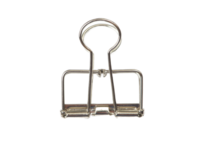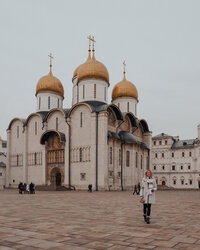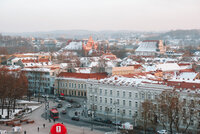

Russian Verbal Aspect: A Complete Guide to Imperfective vs. Perfective Verbs
Hello and welcome to my comprehensive guide on Russian Verbal Aspect!
Did you know that in English we have 12 verb tenses?
- Present simple
- Present continuous
- Present perfect
- Present perfect continuous
- Past simple
- Past continuous
- Past perfect
- Past perfect continuous
- Future simple
- Future continuous
- Future perfect
- Future perfect continuous
. . . What a nightmare, eh?
Last updated: 10/25/2022
Well, with that in mind, I have some good news and some less-good news for you . . .
The good news: Russian only has three verb tenses (past, present, future), woohoo!
The less-good news: In addition to these three verb tenses, Russian verbs have “aspects.”

What is Russian Verbal Aspect?
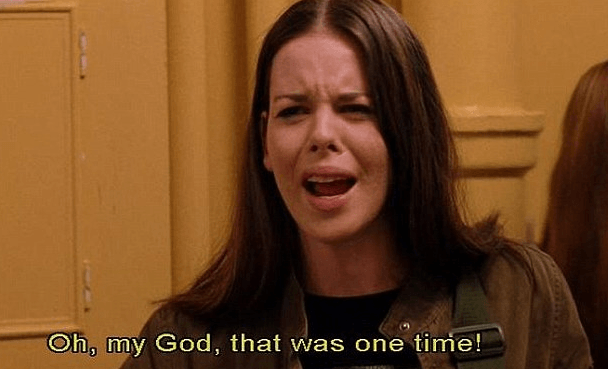

Because there are only three basic verb tenses in Russian, aspects help provide additional context about the nature of an action. Is the action habitual or is it a one-time action? Is the action ongoing or has it been completed? Understanding Russian verbal aspect is essential to being able to express these differences.
In Russian, there are two verbal aspects – the imperfective aspect and the perfective aspect. Most verbs in Russian are considered “aspect pairs” and consist of both an imperfective verb and a perfective verb. We will explore the differences between the two in detail below, but in general, imperfective verbs describe continuous, or habitual actions in the past, present, and future, while perfective verbs describe completed, one-time actions in the past and future.
For example, one aspect pair we will be using in today’s lesson is “читать/прочитать,” meaning “to read.” Take a look at the following example sentences to get an idea of how the verbs are used.
Вчера я читала книгу 3 часа. – Yesterday I read a book for 3 hours. (I didn’t necessarily finish the book, what’s important is that it was a process.)
Я читаю книгу. – I am reading a book. (Right now, at this moment.)
Завтра я буду читать книгу. – Tomorrow I’m going to read a book. (I don’t have a specific goal to finish the book, I’ll just be reading.)
Вчера я прочитала книгу. – Yesterday I read a book (and I finished it.)
Завтра я прочитаю книгу. – Tomorrow I will read a book (and I will finish it.)
Important note: Aspect pairs (ex. читать/прочитать) can have identical meanings, however, the perfective verb often expresses more specific meaning. In the case of читать/прочитать, they both translate to “to read,” but, as noted in the examples above, the perfective verb «прочитать» has an implication of finishing reading, or reading through something.
So, now that we’ve dipped our toes in, let’s dive into the deep end & learn exactly when you should use imperfective verbs and when you should use perfective verbs!
Russian Verbal Aspect: Past, Present & Future






Imperfective Verbs
- Repeated or habitual actions (past, present, future)
- Когда я был в школе, я просыпался каждое утро в 6 утра. – When I was in school I woke up every morning at 6am.
- Я пытаюсь заниматься йогой ежедневно. – I try to do yoga daily.
- Мне надоело убирать за тобой. – I’m tired of cleaning up after you.
- Зимой я буду читать каждый день. – In the winter I am going to read every day.
- Incomplete actions that are currently in progress (present)
- Что ты делаешь сейчас? – What are you doing now?
- Сейчас я слушаю подкаст. – Right now I am listening to a podcast.
- Verbs that describe simultaneous actions, repeated consecutive actions, and actions describing general background information (past, present, future)
- Когда я работала в Санкт-Петербурге, я снимала квартиру. – When I was working in Saint-Petersburg, I rented an apartment.
- Когда я жила дома, у нас с мамой была весёлая рутина. Мы с мамой вместе ходили на пилатес, а потом сразу после этого мы надевали купальники и плавали в океане. – When I lived at home, my mom and I had a fun routine. We would take pilates classes together, and then immediately after, we would put on our bathing suits and swim in the ocean.
- Вчера всё было идеально. Солнце светило, птицы чирикали, и дети играли. – Yesterday was perfect. The sun was shining, the birds were chirping, and the children were playing.
- Пока я езжуна работу, я часто слушаю русскоязычные подкасты. – While I go to work (by transport), I often listen to Russian language podcasts.
- Летом я буду работать учителем английского языка и снимать квартиру. – In the summer, I will be working as an English teacher and renting an apartment.
- В рабочие дни я буду вставать в 6 утра, завтракать , и выходить из дома к 7. – On weekdays, I’ll get up at 6:00 in the morning, have breakfast, and get out of the house by 7:00.
- Я так взволнована завтрашней вечеринкой. Будет живая группа и танцы! – I am so excited for the party tomorrow. There will be a live band and dancing!
- Actions which emphasize a process – not a result (past, present, future)
- Вчера я читала свою книгу три часа. – Yesterday, I read my book for three hours.
- Он учится плавать. – He’s learning to swim.
- Она привыкла жить одна. – She’s used to living alone.
- Завтра я буду работать с девяти до пяти. – Tomorrow, I will be working from nine to five.
- Negated verbs that indicate no intended action occurred (past)
- Я совсем не готовился к экзамену. – I didn’t prepare for the exam at all.
- В детстве я не играла ни на одном инструменте. – I didn’t play any instruments as a child.
- Нет, я не убивал его! – No, I didn’t kill him!
- “Have you (ever) . . . ?” (past)
- Вы когда-нибудь были в Европе? – Have you ever been to Europe?
- Ты читала “Войну и Мир”? – Have you read “War and Peace”?
- Вы видили моего мужа? – Have you seen my husband?
- Reversed, cancelled, net-zero actions
- Я приезжала в казахстан на два месяца. – I went to Kazakhstan for two months. (And now I am back)
- Зачем Мария в солнечных очках? Она выходила? – Why is Maria wearing sunglasses? Did she step out (and come back)?
- Куда вы пропали? Вы ложились? – Where did you go? Were you laying down? (but then you got back up?)






Perfective Verbs
- Single, completed actions in the past – emphasis on result (past)
- Этот фильм уже вышёл на экраны, не так ли? – This film already came out, right?
- Вчера, я прочитала всю книгу. – Yesterday, I read the whole book.
- Single actions that will be completed in the future – emphasis on result (future)
- Тот фильм выйдёт через неделю. – That film will come out in a week.
- Завтра, я прочитаю всю книгу. – Tomorrow, I will read the whole book.
- A sequence of completed actions that occurred/will occur right after one another (past, future)
- Сегодня утром, я проснулась, встала, и приняла душ. – This morning, I woke up, got out of bed, and took a shower.
- Завтра утром, я проснусь, встану, и приму душ. – Tomorrow morning, I will wake up, get out of bed, and take a shower.
- Actions of short duration (past, future)
- Можно с тобой поговорить, всего на минуту? – Can I talk to you for a minute?
- Он посмотрел на часы. – He glanced at his watch.
- После того, как я приеду домой я посплю. – After I get home I’m going to take a nap.
- Negated verbs that indicate an intended action did not occur (past)
- Я не смогла́ найти́ то, что ты проси́ла. – I wasn’t able to find what you’d asked for.
- Сего́дня вечером мы не пошли́ есть в рестора́н только потому, что пошёл си́льный дождь. – We didn’t go to the restaurant to eat this evening only because it started raining hard.
- Прости, что не позвонил раньше. – I’m sorry I didn’t call earlier.






An Overview of Russian Verbal Aspect
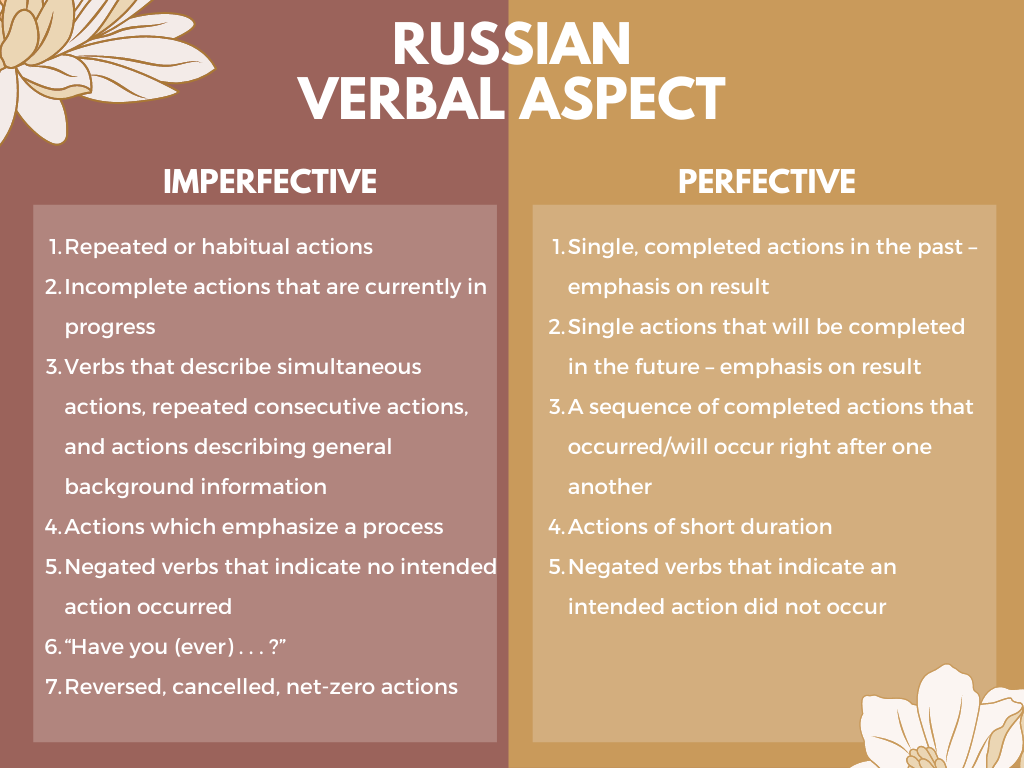







Additional Resources
Check out the websites and videos below for some extra resources to help you understand Russian verbal aspect!
In need of a better way to organize your language notes? Check out my planner below!
Learn to speak russian
Travel with ease & dive into the culture, history & lifestyle of post-Soviet countries
free russian learning materials

Melissa

Get the Goods
Head over to the Language & Travel Shop to check out my favorite goodies I use for learning Russian and traveling! I've compiled all my favorite products I use when #onthebloc so that you can benefit from them when you travel abroad. Help yourself prepare and support this blog at the same time :) Счастливого пути!


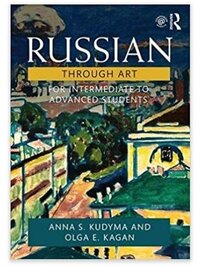

carry-on goods
gifts for travelers
photography
apparel & accessories
textbooks & readers
luggage & bags
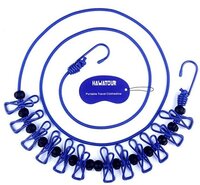
categories
#oTB essentials
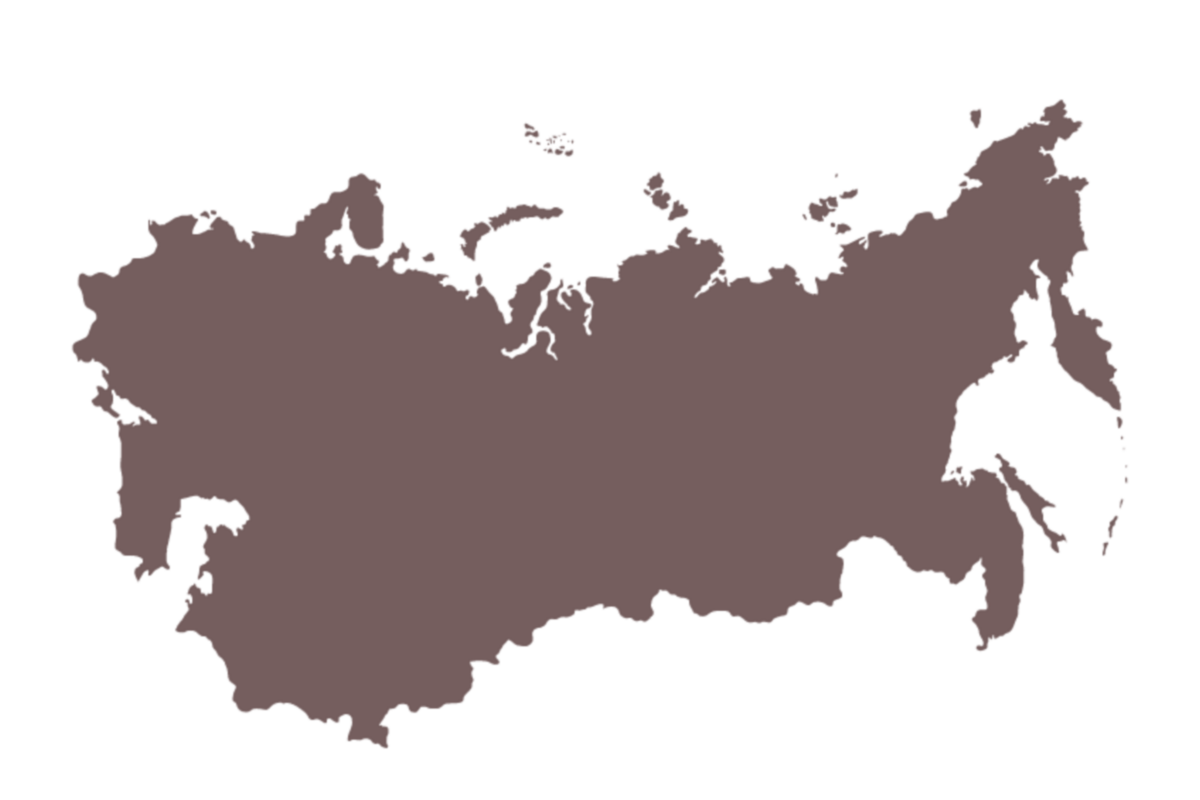
Russian-Speaking Travel Destinations
use your new russian skills in real life!
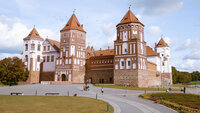
Belarus
EASTERN EUROPE
central Asia
central Asia


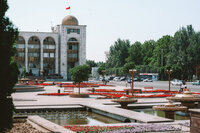

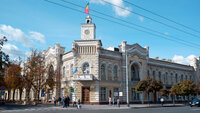
Eurasia
Russia
Kyrgyzstan
armenia
Moldova
Kazakhstan
eastern europe
read »
read »
read »
read »
read »
read »
The caucasus
travel guides
Get your FREE #OnTheBloc Starter Kit!
Sign up for the NGB Monthly Newsletter & you'll get a FREE downloadable PDF with Russian language and travel resources for your post-Soviet journey!
оставаться на связи

